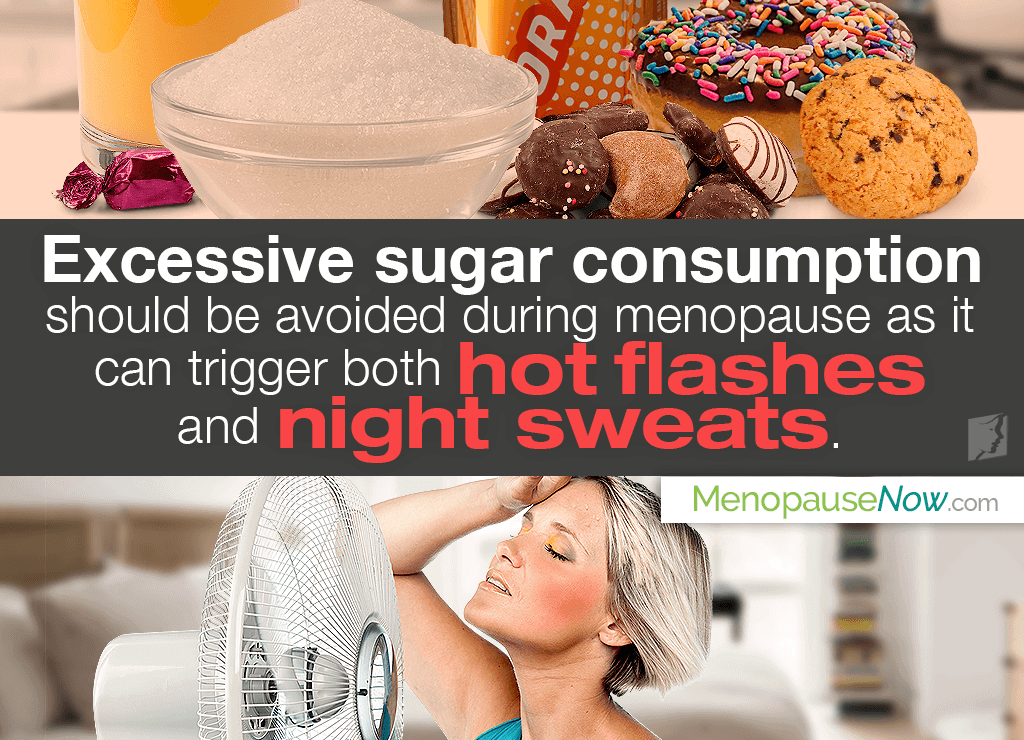Around 80 percent of women passing through perimenopause experience hot flashes and night sweats.1 As such, having a healthy and balanced diet, including eliminating sugar, processed foods, and excess fat, is imperative to making both symptoms infrequent and less disruptive. Continue reading to learn about why changing a high-sugar and fat diet to one that fosters endocrine health will keep you satisfied inside and out.
Why Avoid Excess Fat and Sugar?
Diets high in unhealthy fats and sugars are scientifically found to increase the frequency of menopausal hot flashes and night sweat because they raise blood sugar quickly.2,3,4
Other common choices that may be consumed in a high-fat diet include alcohol and caffeine, both of which have been shown to evoke the onset of vasomotor symptoms.
What Healthy Eating Habits Help Reduce Hot Flashes?
Research has found that women consuming Mediterranean diets and diets higher in fruits and certain vegetables were 20 percent less likely to have vasomotor symptoms.5
The Mediterranean diet includes garlic, peppers, salad greens, whole wheat pasta, olive oil, and fish. It is also low in red meat, processed food, and foods high in simple sugars and unhealthy fats.
Mediterranean diets also have high amounts of fiber, something many North Americans don't get enough of, as well as healthy fats, which are found in nuts, olive oil, avocados, and fatty fish.
Other Dietary Tips for Hot Flashes
Studies have shown that stabilizing blood glucose levels will help diminish hot flashes. A woman can take certain steps to stabilize her glucose levels, such as the following:6,7,8
- Do not skip any meals or wait too long between meals.
- Consume more cinnamon, especially Ceylon cinnamon, which can lower blood glucose levels between 3 - 5%, making it an attractive option for pre-diabetics.
- Eat more fiber from legumes, fruits, whole grains, vegetables, nuts, and seeds. Follow a Mediterranean diet for heightened success.
Recommendations
In moderate to severe cases of hot flashes and night sweats, the aforementioned tips may not be sufficient to treat the root problem: hormonal imbalance. As such, following a more structured treatment plan will be recommended. Read on for more information about hot flash treatments.
Sources
- Cleveland Clinic. (2019). What to Eat When You Have Hot Flashes. Retrieved November 6, 2019, from https://health.clevelandclinic.org/what-to-eat-when-you-have-hot-flashes/
- Organic Consumers Association. (2006). Avoiding Menopausal Hot Flashes by Changing Your Diet. Retrieved November 6, 2019, from https://www.organicconsumers.org/news/avoiding-menopausal-hot-flashes-changing-your-diet
Footnotes:
- MGH Center for Women's Mental Health. (2015). The Immense Burden of Menopausal Symptoms. Retrieved November 6, 2019, from https://womensmentalhealth.org/posts/the-immense-burden-of-menopausal-symptoms/
- Fardet, A. (2016). Minimally processed foods are more satiating and less hyperglycemic than ultra-processed foods: a preliminary study with 98 ready-to-eat foods. Food & Function, 7(5), 2338-2346. doi: 10.1039/c6fo00107f
- Thurston, R.C. et al. (2012). Vasomotor symptoms and insulin resistance in the study of women's health across the nation. The Journal of Clinical Endocrinology & Metabolism, 97(10), 3487-3494. doi: 10.1210/jc.2012-1410
- Lee, S.W. et al. (2012). Association between menopausal symptoms and metabolic syndrome in postmenopausal women. Archives of Gynecology & Obstetrics, 285(2), 541-548. doi: 10.1007/s00404-011-2016-5
- MGH Center for Women's Mental Health. (2013). Mediterranean Diet Benefits Perimenopausal Women with Hot Flashes. Retrieved November 6, 2019, from https://womensmentalhealth.org/posts/mediterranean-diet-benefits-perimenopausal-women-with-hot-flashes/
- Dormire, S. & Howharn, C. (2007). The Effect of Dietary Intake on Hot Flashes in Menopausal Women. Journal of Obstetric, Gynecologic and Neonatal Nursing, 36(3), 255-262. doi: 10.1111/j.1552-6909.2007.00142.x
- NPR. (2013). Cinnamon Can Help Lower Blood Sugar, But One Variety May Be Best. Retrieved November 6, 2019, from https://www.npr.org/sections/thesalt/2013/12/30/255778250/cinnamon-can-help-lower-blood-sugar-but-one-variety-may-be-best
- Mayo Clinic. (2018). Dietary fiber: Essential for a healthy diet. Retrieved November 6, 2019, from https://www.mayoclinic.org/healthy-lifestyle/nutrition-and-healthy-eating/in-depth/fiber/art-20043983




